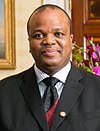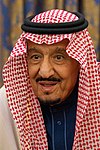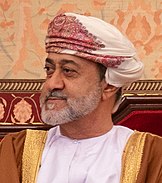Absolute monarchy
Template:Monarchism Template:Basic forms of governmentAbsolute monarchy[1][2] is a form of monarchy in which the monarch rules in his or her own right or power. In an absolute monarchy, the king or queen is by no means limited and has absolute power.[3] Often such monarchies are hereditary.
Absolute monarchy originally emerged in Europe after the social upheaval of the Black Death and Renaissance, and represented a reaction by monarchs to create a centralised state against the counter-balancing forces of medieval society (feudal fragmentation, municipal corporations, etc.). Originally associated with the prestigious Duchy of Burgundy, it later spread as a model to centralize the varied territories of the Kingdom of Spain and the Kingdom of France. The absolutist system of government saw its high point during the late 16th and the 17th century, associated with a more autocratic form of rule under figures such as Louis XIV of France and Philip II of Spain. Attempting to establish an absolutist government along European lines, Charles I of England viewed Parliament as unnecessary, which would ultimately lead to the English Civil War (1642–51) and his execution. Absolutism declined substantially, first following the French Revolution, and later after World War I, both of which led to the popularization of theories of government based on the notion of popular sovereignty. It did however provide a foundation for the newer political theories and movements that emerged to oppose liberal-democracy, such as Legitimism and Carlism in the early 19th century, or "integral nationalism" in the early 20th century.
Absolute monarchies include Brunei, Eswatini,[4] Oman,[5] Saudi Arabia,[6] Vatican City,[7] and the individual emirates composing the United Arab Emirates, which itself is a federation of such monarchies – a federal monarchy.[8][9] Though absolute monarchies are sometimes supported by legal documents, they are distinct from constitutional monarchies, in which the authority of the monarch is restricted (e.g. by legislature or unwritten customs) or balanced by that of other officials, such as a prime minister.[3]
Historical examples of absolute monarchies[edit]
Template:Systems of government
Outside Europe[edit]
In the Ottoman Empire, the Sultan wielded absolute power over the state and was considered a Padishah meaning "Great King" by his people. Many sultans wielded absolute power through heavenly mandates reflected in their title, such as "Shadow of God on Earth". In ancient Mesopotamia, many rulers of Assyria, Babylonia and Sumer were absolute monarchs as well.
Throughout Imperial China, many emperors and one empress (Wu Zetian) wielded absolute power through the Mandate of Heaven. In pre-Columbian America, the Inca Empire was ruled by a Sapa Inca, who was considered the son of Inti, the sun god and absolute ruler over the people and nation. Korea under the Joseon dynasty[10] and short-lived empire was also an absolute monarchy.
Europe[edit]
Throughout much of European history, the divine right of kings was the theological justification for absolute monarchy. Many European monarchs claimed supreme autocratic power by divine right, and that their subjects had no rights to limit their power.
Throughout the Age of Enlightenment, the concept of the divine right to power and democratic ideals were given serious merit.
The Revolutions of 1848, known in some countries as the Springtime of the Peoples[11] or the Springtime of Nations, were a series of political upheavals throughout Europe in 1848. It remains the most widespread revolutionary wave in European history. By the 19th century, divine right was regarded as an obsolete theory in most countries in the Western world, except in Russia where it was still given credence as the official justification for the Tsar's power until February Revolution in 1917 and in the Vatican City where it remains today.
Kingdoms of England and Scotland[edit]
James VI and I and his son Charles I tried to import the principle of divine right into Scotland and England. Charles I's attempt to enforce episcopal polity on the Church of Scotland led to rebellion by the Covenanters and the Bishops' Wars, then fears that Charles I was attempting to establish absolutist government along European lines was a major cause of the English Civil War, despite the fact that he did rule this way for 11 years starting in 1629, after dissolving the Parliament of England for a time.[12]
Denmark–Norway[edit]
Absolutism was underpinned by a written constitution for the first time in Europe in 1665 Template:Lang-da of Denmark–Norway, which ordered that the Monarch:
...shall from this day forth be revered and considered the most perfect and supreme person on the Earth by all his subjects, standing above all human laws and having no judge above his person, neither in spiritual nor temporal matters, except God alone.[13][14]
This law consequently authorized the king to abolish all other centers of power. Most important was the abolition of the Council of the Realm in Denmark. Absolute monarchy lasted until 1814 in Norway, and 1848 in Denmark.
Habsburgs[edit]
This section needs expansion. You can help by adding to it. (August 2021) |
Hungary[edit]
This section needs expansion. You can help by adding to it. (August 2021) |
France[edit]

Louis XIV of France (1638–1715) is often said to have proclaimed L'état, c'est moi!, 'I am the State!'.[15] Although often criticized for his extravagances, such as the Palace of Versailles, he reigned over France for a long period, some historians consider him an absolute monarch, while some other historians[who?] have questioned whether Louis' reign should be considered 'absolute', given the reality of the balance of power between the monarch and the nobility, as well as parliaments.[16][need quotation to verify]
The king of France concentrated legislative, executive, and judicial powers in his person. He was the supreme judicial authority. He could condemn people to death without the right of appeal. It was both his duty to punish offenses and stop them from being committed. From his judicial authority followed his power both to make laws and to annul them.[17]
Prussia[edit]
In Brandenburg-Prussia, the concept of absolute monarch took a notable turn from the above with its emphasis on the monarch as the "first servant of the state", but it also echoed many of the important characteristics of absolutism. Frederick William (r. 1640–1688), known as the Great Elector, used the uncertainties of the final stages of the Thirty Years' War[citation needed] to consolidate his territories into the dominant kingdom in northern Germany, whilst increasing his power over his subjects. His actions largely originated the militaristic streak of the Hohenzollerns.
Frederick William enjoyed support from the nobles, who enabled the Great Elector to undermine the Diet of Brandenburg and other representative assemblies. The leading families saw their future in cooperation with the central government and worked to establish absolutist power.
The most significant indicator of the nobles' success was the establishment of two tax rates – one for the cities and the other for the countryside – to the great advantage of the latter, which the nobles ruled. The nobles served in the upper levels of the elector's army and bureaucracy, but they also won new prosperity for themselves. The support of the Elector enabled the imposition of serfdom and the consolidation of land holdings into vast estates which provided for their wealth.
They became known as Junkers (from the German for young lord, junger Herr). Frederick William faced resistance from representative assemblies and long-independent cities in his realm. City leaders often revolted at the imposition of Electorate authority. The last notable effort was the uprising of the city of Königsberg which allied with the Estates General of Prussia to refuse to pay taxes. Frederick William crushed this revolt in 1662, by marching into the city with thousands of troops. A similar approach was used with the towns of Cleves.[18]
Russia[edit]
Until 1905, the Tsars and Emperors of Russia governed as absolute monarchs. Ivan the Terrible was known for his reign of terror through oprichnina. Peter I the Great reduced the power of the Russian nobility and strengthened the central power of the monarch, establishing a bureaucracy and a police state. This tradition of absolutism, known as Tsarist autocracy, was expanded by Catherine II the Great and her descendants. Although Alexander II made some reforms and established an independent judicial system, Russia did not have a representative assembly or a constitution until the 1905 Revolution. However, the concept of absolutism was so ingrained in Russia that the Russian Constitution of 1906 still described the monarch as an autocrat. Russia became the last European country (excluding Vatican City) to abolish absolutism, and it was the only one to do so as late as the 20th century (the Ottoman Empire drafted its first constitution in 1876).
Sweden[edit]
The form of government instituted in Sweden under King Charles XI and passed on to his son, Charles XII is commonly referred to as absolute monarchy; however, the Swedish monarch was never absolute in the sense that he wielded arbitrary power. The monarch still ruled under the law and could only legislate in agreement with the Riksdag of the Estates; rather, the absolutism introduced was the monarch's ability to run the government unfettered by the privy council, contrary to earlier practice. The absolute rule of Charles XI was instituted by the crown and the Riksdag in order to carry out the Great Reduction which would have been made impossible by the privy council which comprised the high nobility.
After the death of Charles XII in 1718, the system of absolute rule was largely blamed for the ruination of the realm in the Great Northern War, and the reaction tipped the balance of power to the other extreme end of the spectrum, ushering in the Age of Liberty. After half a century of largely unrestricted parliamentary rule proved just as ruinous, King Gustav III seized back royal power in the coup d'état of 1772, and later once again abolished the privy council under the Union and Security Act in 1789, which, in turn, was rendered void in 1809 when Gustav IV Adolf was deposed in a coup and the constitution of 1809 was put in its place. The years between 1789 and 1809, then, are also referred to as a period of absolute monarchy.
Contemporary trends[edit]
Many nations formerly with absolute monarchies, such as Jordan, Kuwait, and Morocco, have moved towards constitutional monarchy. However, in these cases the monarch still retains tremendous power, even to the extent that by some measures, parliament's influence on political life is viewed as negligible.[lower-alpha 1][20][21]
In Bhutan, the government moved from absolute monarchy to constitutional monarchy following planned parliamentary elections to the Tshogdu in 2003, and the election of a National Assembly in 2008.
Nepal had several swings between constitutional rule and direct rule related to the Nepalese Civil War, the Maoist insurgency, and the 2001 Nepalese royal massacre, with the Nepalese monarchy being abolished on 28 May 2008.[22]
In Tonga, the king had majority control of the Legislative Assembly until 2010.[23]
Liechtenstein has moved towards expanding the power of the monarch: the Prince of Liechtenstein was given expanded powers after a referendum amending the Constitution of Liechtenstein in 2003, which led the BBC to describe the prince as an "absolute monarch again".[24]
Current absolute monarchies[edit]
| Realm | Image | Monarch | Born | Age | Reign Since | Reign Length | Succession | Ref(s) |
|---|---|---|---|---|---|---|---|---|
 |
Sultan Hassanal Bolkiah | 15 July 1946 | 79 years, 108 days | 4 October 1967 | 58 years, 27 days | Hereditary | [25] | |
| Template:Country data Sharjah |  |
Ruler Sultan bin Muhammad Al-Qasimi | 2 July 1939 | 86 years, 121 days | 25 January 1972 | 53 years, 279 days | Hereditary | [26] |
| Template:Country data Fujairah |  |
Ruler Hamad bin Mohammed Al Sharqi | 22 February 1949 | 76 years, 251 days | 18 September 1974 | 51 years, 43 days | Hereditary | [26] |
| Template:Country data Ajman | Ruler Humaid bin Rashid Al Nuaimi III | 1931 | 93–94 years | 6 September 1981 | 44 years, 55 days | Hereditary | [26] | |
 |
Ngwenyama Mswati III | 19 April 1968 | 57 years, 195 days | 25 April 1986 | 39 years, 189 days | Hereditary and elective | [27] | |
| Template:Country data Dubai |  |
Ruler Mohammed bin Rashid Al Maktoum | 15 July 1949 | 76 years, 108 days | 4 January 2006 | 19 years, 300 days | Hereditary | [26] |
| Template:Country data Umm al-Quwain |  |
Ruler Saud bin Rashid Al Mualla | 1 October 1952 | 73 years, 30 days | 2 January 2009 | 16 years, 302 days | Hereditary | [26] |
| Template:Country data Ras al-Khaimah |  |
Ruler Saud bin Saqr Al Qasimi | 10 February 1956 | 69 years, 263 days | 27 October 2010 | 15 years, 4 days | Hereditary | [26] |
 |
Supreme Pontiff Francis | 17 December 1936 | 88 years, 318 days | 13 March 2013 | 12 years, 232 days | Elective | [28] | |
| Template:Country data Kingdom of Saudi Arabia |  |
King Salman bin Abdul‘aziz | 31 December 1935 | 89 years, 304 days | 23 January 2015 | 10 years, 281 days | Hereditary and elective | [29] |
 |
Sultan Haitham bin Tariq Al Said | 11 October 1954 | 71 years, 20 days | 11 January 2020 | 5 years, 293 days | Hereditary | [30][31] | |
| Template:Country data Abu Dhabi |  |
Ruler Mohamed bin Zayed Al Nahyan | 11 March 1961 | 64 years, 234 days | 13 May 2022 | 3 years, 171 days | Hereditary | [26] |
Saudi Arabia[edit]
Saudi Arabia is an absolute monarchy, and according to the Basic Law of Saudi Arabia adopted by Royal Decree in 1992, the King must comply with Shari'a (Islamic law) and the Qur'an.[6] The Qur'an and the body of the Sunnah (traditions of the Islamic prophet, Muhammad) are declared to be the Kingdom's Constitution, but no written modern constitution has ever been promulgated for Saudi Arabia, which remains the only Arab nation where no national elections have ever taken place since its founding.[32][33] No political parties or national elections are permitted.[6][34] The Saudi government is the world's most authoritarian regime in 2023 measured by the electoral democracy score of the V-Dem Democracy indices.[35]
Scholarship[edit]
There is a considerable variety of opinion by historians on the extent of absolutism among European monarchs. Some, such as Perry Anderson, argue that quite a few monarchs achieved levels of absolutist control over their states, while historians such as Roger Mettam dispute the very concept of absolutism.[36] In general, historians who disagree with the appellation of absolutism argue that most monarchs labeled as absolutist exerted no greater power over their subjects than any other non-absolutist rulers, and these historians tend to emphasize the differences between the absolutist rhetoric of monarchs and the realities of the effective use of power by these absolute monarchs. Renaissance historian William Bouwsma summed up this contradiction:
Nothing so clearly indicates the limits of royal power as the fact that governments were perennially in financial trouble, unable to tap the wealth of those ablest to pay, and likely to stir up a costly revolt whenever they attempted to develop an adequate income.[37]
— William Bouwsma
Anthropology, sociology, and ethology as well as various other disciplines such as political science attempt to explain the rise of absolute monarchy ranging from extrapolation generally, to certain Marxist explanations in terms of the class struggle as the underlying dynamic of human historical development generally and absolute monarchy in particular.
In the 17th century, French legal theorist Jean Domat defended the concept of absolute monarchy in works such as "On Social Order and Absolute Monarchy", citing absolute monarchy as preserving natural order as God intended.[38] Other intellectual figures who supported absolute monarchy include Thomas Hobbes and Charles Maurras.
See also[edit]
Footnotes[edit]
- ↑ "By 1985 the legislature appeared to have become more firmly established and recognized as a body in which notables representing authentic forces in the political spectrum could address national issues and problems. But it had not gained real autonomy or a direct role in the shaping of government policies." [...] "In spite of its formally defined role in the lawmaking and budgetary processes, the parliament had not established itself as an independent branch of government, owing to the restrictions on its constitutional authority and the dominating influence of the king. The fact that the king has been able to govern for long periods by zahir after dissolving the legislative body has further underscored the marginality of the chamber." — J.R. Tartter (1986)[19]
References[edit]
- ↑ Goldie, Mark; Wokler, Robert (2006-08-31). "Philosophical kingship and enlightened despotism". The Cambridge History of Eighteenth-Century Political Thought. Cambridge University Press. p. 523. ISBN 9780521374224. Retrieved 13 January 2016.
- ↑ Leopardi, Giacomo (2013) [1898]. Zibaldone. Farrar Straus Giroux. p. 1438. ISBN 978-0374296827.
- ↑ 3.0 3.1 Harris, Nathanial (2009). Systems of Government Monarchy. Evans Brothers. ISBN 978-0-237-53932-0.
- ↑ "Swaziland profile". BBC News. 2018-09-03.
- ↑ "Q&A: Elections to Oman's consultative Council". BBC News. 2011-10-13.
- ↑ 6.0 6.1 6.2 Cavendish, Marshall (2007). World and Its Peoples: the Arabian Peninsula. Marshall Cavendish. p. 78. ISBN 978-0-7614-7571-2.
- ↑ "Organi dello Stato" [State Departments]. vaticanstate.va. Vatican State. Archived from the original on 2013-11-02. Retrieved 2014-01-25.
"State Departments". vaticanstate.va. Vatican State. Archived from the original on 2020-04-11. Retrieved 2019-09-21. - ↑ Stephens, Michael (2013-01-07). "Qatar: Regional backwater to global player". BBC News.
- ↑ "Vatican to emirates, monarchs keep the reins in modern world". The Times of India. Archived from the original on 2013-10-16.
- ↑ Choi, Sang-hun (27 October 2017). Interior Space and Furniture of Joseon Upper-class Houses. Ewha Womans University Press. p. 16. ISBN 9788973007202 – via Google Books.
Joseon was an absolute monarchy
- ↑ Merriman, John (1996). A History of Modern Europe: From the French Revolution to the present. p. 715.
- ↑ "Charles I of England". World History Encyclopedia. Retrieved 17 April 2023.
- ↑ "Kongeloven af 1665" (in dansk). Danske konger. Archived from the original on 2012-03-30.
- ↑ A partial English translation of the law can be found in
Ekman, Ernst (1957). "The Danish Royal Law of 1665". The Journal of Modern History. 29 (2): 102–107. doi:10.1086/237987. S2CID 145652129. - ↑ "Louis XIV". HISTORY. Retrieved 2018-10-05.
- ↑ Mettam, R. Power and Faction in Louis XIV's France, Oxford: Basil Blackwell, 1988.
- ↑ Mousnier, R. The Institutions of France under the Absolute Monarchy, 1598-2012 V1. Chicago: The University of Chicago Press, 1979.
- ↑ The Western Experience, Seventh Edition, Boston: McGraw-Hill, 1999.
- ↑ Tartter, Jean R. (1986). "Government and politics". In Nelson, Harold D. (ed.). Morocco, a country study. Area Handbook. Foreign Area Studies: The American University. pp. 246–247. OCLC 12749718.
- ↑ Tusalem, Rollin F. (16 September 2021). "Bringing the legislature back in: Examining the structural effects of national legislatures on effective democratic governance". Government and Opposition. 58 (2): 291–315. doi:10.1017/gov.2021.32. ISSN 0017-257X. S2CID 240505261.
- ↑ Rafayah, Shakir (29 January 2022). "What role for political parties in Jordan?". Arab Weekly. Retrieved 25 March 2022.
- ↑ Sharma, Gopal (2008-05-29). "Nepal abolishes centuries-old Hindu monarchy". Reuters. Retrieved 2020-12-01.
- ↑ Constitution of Tonga Archived 2008-11-19 at the Wayback Machine, s. 61
- ↑ "Liechtenstein prince wins powers". BBC News. 2003-03-16. Retrieved 2015-10-26.
- ↑ Government of Brunei. "Prime Minister". The Royal Ark. Office of the Prime Minister. Archived from the original on 7 October 2011. Retrieved 12 November 2011.
- ↑ 26.0 26.1 26.2 26.3 26.4 26.5 26.6 Walters, Timothy; Barwind, Jack A. (January 2004). "Media and Modernity in the United Arab Emirates: Searching for the Beat of a Different Drummer". Free Speech Yearbook. 41 (1): 151–163. doi:10.1080/08997225.2004.10556311. S2CID 108530356.
Seven absolute monarchs exercise political power over a federation established in 1971.
- ↑ Simelane, H.S. (2005), "Swaziland: Mswati III, Reign of", in Shillington, Kevin (ed.), Encyclopedia of African history, vol. 3, Fitzroy Dearborn, pp. 1528–30, 9781579584559
- ↑ "Argentina's Jorge Mario Bergoglio elected Pope". BBC News. Retrieved 13 March 2013.
- ↑ "Saudi Arabia's King Abdullah dies". BBC News. 23 January 2015. Retrieved 23 January 2015.
- ↑ Sultan Qaboos Centre for Islamic Culture. "About H.M the Sultan". Government of Oman, Diwan of the Royal Court. Archived from the original on 18 January 2012. Retrieved 12 November 2011.
- ↑ Nyrop, Richard F (2008). Area Handbook for the Persian Gulf States. Wildside Press LLC. p. 341. ISBN 978-1-4344-6210-7.
- ↑ Robbers, Gerhard (2007). Encyclopedia of world constitutions, Volume 1. p. 791. ISBN 978-0-8160-6078-8.
- ↑ "Qatar elections to be held in 2013 - Emir". BBC News. November 2011. Archived from the original on 2012-01-06. Retrieved 27 February 2021.
- ↑ The Economist Intelligence Unit. "The Economist Democracy Index 2010" (PDF). The Economist. Retrieved 6 June 2011.
- ↑ Coppedge, Michael, John Gerring, Carl Henrik Knutsen, Staffan I. Lindberg, Jan Teorell, Nazifa Alizada, David Altman, Michael Bernhard, Agnes Cornell, M. Steven Fish, Lisa Gastaldi, Haakon Gjerløw, Adam Glynn, Allen Hicken, Garry Hindle, Nina Ilchenko, Joshua Krusell, Anna Lührmann, Seraphine F. Maerz, Kyle L. Marquardt, Kelly McMann, Valeriya Mechkova, Juraj Medzihorsky, Pamela Paxton, Daniel Pemstein, Josefine Pernes, Johannes von Römer, Brigitte Seim, Rachel Sigman, Svend-Erik Skaaning, Jeffrey Staton, Aksel Sundström, Eitan Tzelgov, Yi-ting Wang, Tore Wig, Steven Wilson and Daniel Ziblatt. 2021. "V-Dem [Country–Year/Country–Date] Dataset v11.1" Varieties of Democracy (V-Dem) Project. https://doi.org/10.23696/vdemds21.
- ↑ Mettam, Roger. Power and Faction in Louis XIV's France, 1991.
- ↑ Bouwsma, William J., in Kimmel, Michael S. Absolutism and Its Discontents: State and Society in Seventeenth-Century France and England. New Brunswick, NJ: Transaction Books, 1988, 15
- ↑ Domat, Jean (18 April 2009). "On Defense of Absolute Monarchy". Cornell College Student Symposium. Mount Vernon, IA: Cornell College.
Further reading[edit]
- Anderson, Perry. (1961, 1974). Lineages of the Absolutist State. London: Verso.
- Beloff, Max. The Age of Absolutism 1660-1815.
- Blum, Jerome, et al. (1970). The European World, vol 1, pp 267–466.
- Blum, Jerome, et al. (1951). Lord and Peasant in Russia from the Ninth to the Nineteenth Century. Princeton, NJ: Princeton University Press.
- Kimmel, Michael S. (1988). Absolutism and Its Discontents: State and society in seventeenth-century France and England. New Brunswick, NJ: Transaction Books.
- Méttam, Roger. (1988). Power and Faction in Louis XIV's France. New York: Blackwell Publishers.
- Miller, John (ed.) (1990). Absolutism in Seventeenth-Century Europe. New York: Palgrave Macmillan.
- Wilson, Peter H. (2000). Absolutism in Central Europe. New York: Routledge.
- Zmohra, Hillay. (2001). Monarchy, Aristocracy, and the State in Europe – 1300–1800. New York: Routledge.
Template:Authoritarian types of rule

